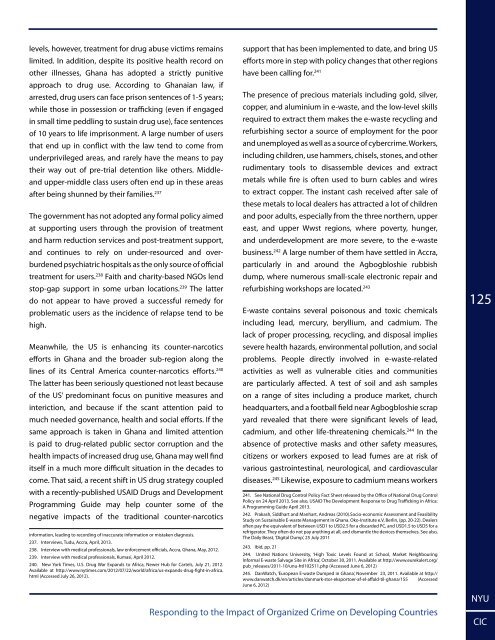here - Center on International Cooperation - New York University
here - Center on International Cooperation - New York University
here - Center on International Cooperation - New York University
Create successful ePaper yourself
Turn your PDF publications into a flip-book with our unique Google optimized e-Paper software.
levels, however, treatment for drug abuse victims remains<br />
limited. In additi<strong>on</strong>, despite its positive health record <strong>on</strong><br />
other illnesses, Ghana has adopted a strictly punitive<br />
approach to drug use. According to Ghanaian law, if<br />
arrested, drug users can face pris<strong>on</strong> sentences of 1-5 years;<br />
while those in possessi<strong>on</strong> or trafficking (even if engaged<br />
in small time peddling to sustain drug use), face sentences<br />
of 10 years to life impris<strong>on</strong>ment. A large number of users<br />
that end up in c<strong>on</strong>flict with the law tend to come from<br />
underprivileged areas, and rarely have the means to pay<br />
their way out of pre-trial detenti<strong>on</strong> like others. Middle-<br />
and upper-middle class users often end up in these areas<br />
after being shunned by their families. 237<br />
The government has not adopted any formal policy aimed<br />
at supporting users through the provisi<strong>on</strong> of treatment<br />
and harm reducti<strong>on</strong> services and post-treatment support,<br />
and c<strong>on</strong>tinues to rely <strong>on</strong> under-resourced and overburdened<br />
psychiatric hospitals as the <strong>on</strong>ly source of official<br />
treatment for users. 238 Faith and charity-based NGOs lend<br />
stop-gap support in some urban locati<strong>on</strong>s. 239 The latter<br />
do not appear to have proved a successful remedy for<br />
problematic users as the incidence of relapse tend to be<br />
high.<br />
Meanwhile, the US is enhancing its counter-narcotics<br />
efforts in Ghana and the broader sub-regi<strong>on</strong> al<strong>on</strong>g the<br />
lines of its Central America counter-narcotics efforts. 240<br />
The latter has been seriously questi<strong>on</strong>ed not least because<br />
of the US’ predominant focus <strong>on</strong> punitive measures and<br />
intericti<strong>on</strong>, and because if the scant attenti<strong>on</strong> paid to<br />
much needed governance, health and social efforts. If the<br />
same approach is taken in Ghana and limited attenti<strong>on</strong><br />
is paid to drug-related public sector corrupti<strong>on</strong> and the<br />
health impacts of increased drug use, Ghana may well find<br />
itself in a much more difficult situati<strong>on</strong> in the decades to<br />
come. That said, a recent shift in US drug strategy coupled<br />
with a recently-published USAID Drugs and Development<br />
Programming Guide may help counter some of the<br />
negative impacts of the traditi<strong>on</strong>al counter-narcotics<br />
informati<strong>on</strong>, leading to recording of inaccurate informati<strong>on</strong> or mistaken diagnosis.<br />
237. Interviews, Tudu, Accra, April, 2013.<br />
238. Interview with medical professi<strong>on</strong>als, law enforcement officials, Accra, Ghana, May, 2012.<br />
239. Interview with medical professi<strong>on</strong>als, Kumasi, April 2012.<br />
240. <strong>New</strong> <strong>York</strong> Times, U.S. Drug War Expands to Africa, <strong>New</strong>er Hub for Cartels, July 21, 2012.<br />
Available at http://www.nytimes.com/2012/07/22/world/africa/us-expands-drug-fight-in-africa.<br />
html (Accessed July 26, 2012).<br />
support that has been implemented to date, and bring US<br />
efforts more in step with policy changes that other regi<strong>on</strong>s<br />
have been calling for. 241<br />
The presence of precious materials including gold, silver,<br />
copper, and aluminium in e-waste, and the low-level skills<br />
required to extract them makes the e-waste recycling and<br />
refurbishing sector a source of employment for the poor<br />
and unemployed as well as a source of cybercrime. Workers,<br />
including children, use hammers, chisels, st<strong>on</strong>es, and other<br />
rudimentary tools to disassemble devices and extract<br />
metals while fire is often used to burn cables and wires<br />
to extract copper. The instant cash received after sale of<br />
these metals to local dealers has attracted a lot of children<br />
and poor adults, especially from the three northern, upper<br />
east, and upper Wwst regi<strong>on</strong>s, w<str<strong>on</strong>g>here</str<strong>on</strong>g> poverty, hunger,<br />
and underdevelopment are more severe, to the e-waste<br />
business. 242 A large number of them have settled in Accra,<br />
particularly in and around the Agbogbloshie rubbish<br />
dump, w<str<strong>on</strong>g>here</str<strong>on</strong>g> numerous small-scale electr<strong>on</strong>ic repair and<br />
refurbishing workshops are located. 243<br />
E-waste c<strong>on</strong>tains several pois<strong>on</strong>ous and toxic chemicals<br />
including lead, mercury, beryllium, and cadmium. The<br />
lack of proper processing, recycling, and disposal implies<br />
severe health hazards, envir<strong>on</strong>mental polluti<strong>on</strong>, and social<br />
problems. People directly involved in e-waste-related<br />
activities as well as vulnerable cities and communities<br />
are particularly affected. A test of soil and ash samples<br />
<strong>on</strong> a range of sites including a produce market, church<br />
headquarters, and a football field near Agbogbloshie scrap<br />
yard revealed that t<str<strong>on</strong>g>here</str<strong>on</strong>g> were significant levels of lead,<br />
cadmium, and other life-threatening chemicals. 244 In the<br />
absence of protective masks and other safety measures,<br />
citizens or workers exposed to lead fumes are at risk of<br />
various gastrointestinal, neurological, and cardiovascular<br />
diseases. 245 Likewise, exposure to cadmium means workers<br />
241. See Nati<strong>on</strong>al Drug C<strong>on</strong>trol Policy Fact Sheet released by the Office of Nati<strong>on</strong>al Drug C<strong>on</strong>trol<br />
Policy <strong>on</strong> 24 April 2013. See also, USAID The Development Resp<strong>on</strong>se to Drug Trafficking in Africa:<br />
A Programming Guide April 2013.<br />
242. Prakash, Siddhart and Manhart, Andreas (2010).Socio-ec<strong>on</strong>omic Assessment and Feasibility<br />
Study <strong>on</strong> Sustainable E-waste Management in Ghana. Oko-Institute e.V, Berlin, (pp. 20-22). Dealers<br />
often pay the equivalent of between USD1 to USD2.5 for a discarded PC, and USD1.5 to USD5 for a<br />
refrigerator. They often do not pay anything at all, and dismantle the devices themselves. See also,<br />
The Daily Beast, ‘Digital Dump’, 25 July 2011<br />
243. Ibid, pp. 21<br />
244. United Nati<strong>on</strong>s <strong>University</strong>, ‘High Toxic Levels Found at School, Market Neighbouring<br />
Informal E-waste Salvage Site in Africa’, October 30, 2011. Available at http://www.eurekalert.org/<br />
pub_releases/2011-10/unu-htl102511.php (Accessed June 6, 2012)<br />
245. DanWatch, ‘European E-waste Dumped in Ghana’, November 23, 2011. Available at http://<br />
www.danwatch.dk/en/articles/danmark-stor-eksportoer-af-el-affald-til-ghana/155 (Accessed<br />
June 6, 2012)<br />
Resp<strong>on</strong>ding to the Impact of Organized Crime <strong>on</strong> Developing Countries<br />
125<br />
NYU<br />
CIC
















